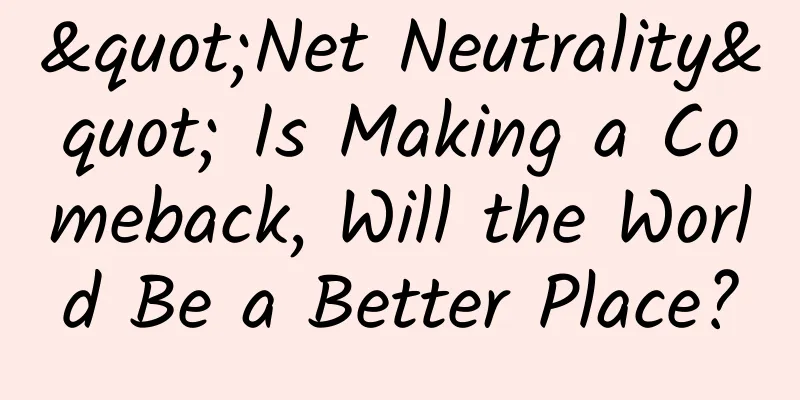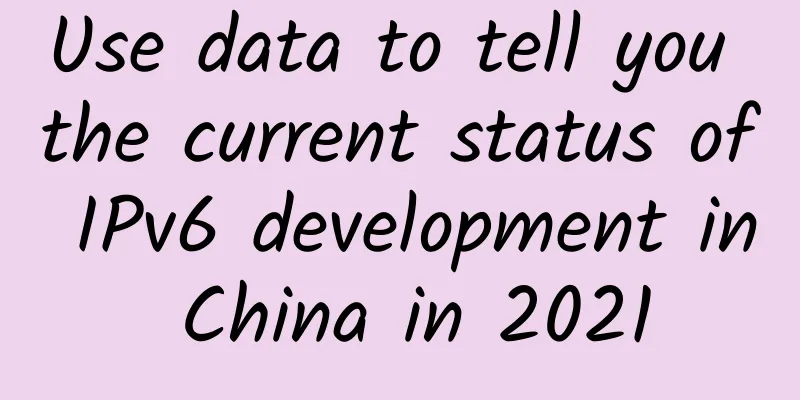"Net Neutrality" Is Making a Comeback, Will the World Be a Better Place?

|
As part of his plan to promote large-scale infrastructure construction, US President Biden signed an executive order on July 9 urging the Federal Communications Commission (FCC) to restore network neutrality rules that were repealed by the Trump administration in December 2017 to promote competition in the US economy. "Network neutrality" has once again become one of the focal issues in the US party struggle and has attracted attention and discussion on social media. 1. Looking back at history, during Obama's administration, the FCC, chaired by Democrat Tom Wheeler, passed a network neutrality proposal in 2015, prohibiting network service providers from blocking or slowing down Internet access speeds and prohibiting Internet content providers from enjoying access priority by paying, in order to maintain the principles of open and fair Internet. But just two years later (2017), Ajit Pai, the FCC chairman appointed by Republican President Trump, completely ended the Obama-era network neutrality principle and implemented a "low-regulation" policy. Broadband Internet access and mobile networks were no longer classified as highly regulated "public utilities", but were reclassified as "information services" and "private mobile services" to stimulate investment, innovation and competition. Four years later (2021), Biden's Democratic government has made a comeback on "net neutrality". This is not only a dispute between the ruling philosophies of the Democratic and Republican parties, but also the result of a game of interests between the two major forces represented by them: Internet service providers and Internet content providers. Internet giants that supported Biden's presidential victory, led by Facebook, Google, Twitter, etc., hope to restore the principle of network neutrality to ensure that every user has unrestricted access to Internet services, which can easily occupy the moral high ground and win public support; but while striving for their content services to be free from network restrictions, they are also happy to use this to crack down on the competitive behavior of network service providers such as AT&T and Verizon who create their own content and sell it in packages with traffic packages. Internet service providers such as AT&T and Verizon certainly hope to gain greater added value from the broadband networks built with huge fixed capital investments, rather than becoming "dumb pipes" working for Internet companies. So they have been complaining that big traffic consumers such as YouTube and Netflix have made a fortune by taking advantage of the network neutrality principle, while they have to be led by the other party's business experience demands and make endless investments in network expansion and speed-up, which is unfair. Judging from the development history of the US communications industry, regulators who advocate market competition have always been vigilant about the possibility that Internet service providers may use their infrastructure advantages to form a market monopoly. The principle of network neutrality is another tool of checks and balances that regulators have found since they took severe measures to split AT&T in 1984. Its purpose is to promote the innovation and development of Internet business through a fair network environment, and ultimately cultivated global Internet giants such as Amazon, Google, Facebook, and Netflix. When the net neutrality proposal was passed in February 2015, Google's parent company Alphabet's stock price on the stock exchange was $556.87. By December 2017, when net neutrality was terminated, its stock price had soared to $1,046.40; during the same period, Facebook's stock price also rose from $74.47 to $179. On the other hand, in the communications market, after AT&T was split into eight independently operated telephone companies, several years of competition and cooperation have gradually formed three major communications operator groups, with AT&T, Verizon, and T-Mobile, which recently merged with Sprint, as the mainstream. They have launched fierce competition in network construction and user acquisition across the United States, but soon discovered that the real enemy actually came from outside: from the early development of broadband business, when voice business was invaded by Internet telephone service providers such as Skype, to now, almost all of its revenue depends on the traffic business brought by Internet applications such as video, social networking, and shopping. In order to get rid of the situation of being controlled by others and regain the right to speak in the market, Verizon and AT&T took the lead in launching a counterattack. Verizon successively acquired AOL (America Online) and Yahoo to enter the Internet media and advertising market; AT&T also gradually increased its media business, successively acquired DirectTV and Time Warner (Time Warner) in an attempt to transform its struggling broadband operator identity into the world's largest entertainment media company spanning film production, drama production, cable television, news channels, mobile networks and fiber optic cables. Moreover, after the repeal of the net neutrality principle, AT&T publicly advertised that mobile phone users could be exempted from data caps when using its DirecTV Now video service, while imposing data caps on competing video services such as YouTube TV, Netflix and Amazon Prime. At the same time, in order to compete with Internet content providers for users, AT&T also launched a preferential policy of free HBO programs for its mobile phone users. Sprint, which is in the same camp as AT&T, also once took data speed reduction restrictions on Skype, YouTube and Netflix. Therefore, the Biden administration restarted the principle of network neutrality after coming to power. The essence of this is to carry out a new round of interest adjustments between the two major power groups: broadband service providers and Internet content providers. This also caters to the political will of the establishment to regulate market competition to a certain extent. 2. The political opinion of network neutrality is also welcomed in Europe across the ocean. In order to build a digital single market, the European Parliament voted to pass the network neutrality protection clause in April 2014, one step ahead of the United States. Its purpose is to promote competition in the EU Internet access service market and stimulate the construction of high-speed communication networks. However, after several years, the communication operators in European countries have built first-class mobile communication networks, but they finally found that they were making wedding clothes for the American Internet giants. With strong first-mover advantage, American Internet giants such as Google, Amazon, and FacebooK have extended their business tentacles from the United States to Europe and quickly completed the division of the European Internet market. They not only firmly dominate the European Internet technology landscape, but have also penetrated into e-commerce, logistics, finance, mobile travel and other fields. Taking Germany as an example, Google monopolizes the German search engine market with a market share of 92%, and its share in the browser market and online advertising market has reached more than 60%. Facebook occupies more than 70% of the social media market. Among the 20 Internet companies with the largest market value in the world, none is a European company. As Deutsche Telekom CEO Timotheon Hoettges recently angrily complained at the Mobile World Congress in Barcelona, Internet applications of American giants such as Facebook and Microsoft generate more than 80% of network traffic in Europe, but they do not need to pay a penny to local telecom operators for this. Instead, they can reap excess profits through the user data they collect. This is not only unfair, but also a disguised exploitation of telecom operators who are constantly investing costs to expand network support capabilities. Therefore, in Europe, due to differences in industrial advantages and business positioning, the principle of network neutrality has become a protective umbrella for American Internet giants, but a shackle for local communication operators! Therefore, European telecom operators have been seeking regulators to relax network neutrality rules in order to increase revenue from specialized services to make up for the decline in turnover of traditional telecommunications business. To this end, they even threatened and lobbied on the grounds that the principle of network neutrality jeopardized 5G investment. The European Commission had set a goal in its 2016 European 5G Action Plan that “all EU countries will launch 5G services by the end of 2020 at the latest”, but the goal has failed due to slow progress. The reason is certainly due to the city blockade caused by the COVID-19 pandemic, but the concerns of telecommunications operators about the return on investment in 5G are also an important reason. Unlike the United States and China, which have vast land areas and whose communications markets are mainly dominated by 3 to 4 operators, Europe's communications market is very fragmented. Even in countries with small areas, there are often more than 3 operators competing, so it is difficult to form economies of scale. As a result, the return on investment in the European communications market is generally low. Taking 2018 as an example, the return on investment capital in the United States in the communications field was twice that of Europe. The construction and maintenance costs of 5G networks are several times that of 4G. Therefore, if EU regulators cannot remove the shackles of network neutrality for communication operators, it means that the heavily invested 5G networks will provide higher data transmission rates for Internet giants, mainly American companies, but if operators can only get fixed traffic revenue, the benefits will obviously be limited. This is nothing more than the beginning of a new round of exploitation. Therefore, European communication operators pay more attention to the application of 5G technology in vertical industries. With the technical characteristics of 5G's high speed, low latency and massive connections, as well as the unique solutions of slicing technology and edge cloud, communication operators can directly provide personalized and even proprietary network services to corporate users and create a new industrial ecology. In this ecology, the advantages of American Internet giants are no longer there. Communication operators can form a more equal or even slightly advantageous cooperative relationship with vertical industry users to promote the commercialization of 5G technology. However, from a legal perspective, it is obviously contrary to the principle of network neutrality for communications operators to provide 5G slicing technology and private network solutions to specific users in vertical industries and charge additional fees. Therefore, while European regulators adhere to the principle of network neutrality to ensure fair access to the Internet for all ordinary consumers, they also allow the innovation of proprietary services required by various industry applications through the "exemption of professional services" method to promote the industrialization of 5G in Europe and the process of digitalization in Europe. This is also the reason why 5G private network services are developing rapidly in Europe. At the same time, from the perspective of maintaining digital sovereignty, the EU has also taken a series of measures, including issuing the General Data Protection Regulation, promoting the "digital tax" plan, and even increasing antitrust reviews and fines on US Internet giants such as Google and Facebook to safeguard Europe's Internet interests. However, from a regulatory perspective, abolishing the principle of network neutrality is contrary to the values of open competition advocated by Europe, and there is a risk of abuse by communications operators to infringe on the rights of ordinary consumers, so it is still unacceptable. In this regard, South Korea, also an ally of the United States, has taken a more radical approach than Europe. Recently, in a legal case between American video service provider Netflix and South Korean telecom operator SK Broadband over data traffic payment, a court in Seoul, South Korea, ruled that part of Netflix's current business operating costs were in fact borne by SK Broadband, and that paying for this was "reasonable." This ruling rejected Netflix's complaint based on the principle of network neutrality, and is considered a landmark event that South Korea's "network neutrality scale" has tilted toward telecom operators. As a result, the impact of this ruling on the development of South Korea's communications market, changes in the business strategies of American Internet giants, and even the direction of global network neutrality policies has become a focus of close attention in the industry. 3. Finally, let’s look at China. Except for the fact that in the early stages of the rise of mobile Internet business, China Mobile executives criticized WeChat, QQ and other applications for impacting its traditional voice and SMS business, network neutrality has never been a topic worth discussing in China, because the problem that Chinese communication operators need to face is "speeding up and reducing fees." In 2015, the FCC of the United States passed the Net Neutrality Act, and the General Office of the State Council of China issued the "Guiding Opinions on Accelerating the Construction of High-speed Broadband Networks and Promoting Network Speed Increase and Fee Reduction" for the first time. The guiding opinions clearly defined the positioning of "broadband networks as national strategic public infrastructure" and required telecommunications companies to "accelerate the construction of broadband network infrastructure, further increase speed and reduce fees, and improve service levels." Also in 2015, "Internet Plus" was written into the government work report for the first time and became a major national initiative. "Internet Plus" has become an important engine for China's innovation-driven strategy. Internet companies represented by BAT have stated that they will play a leading role in the 11 key action areas identified by the government, including innovation and entrepreneurship, collaborative manufacturing, modern agriculture, and e-commerce. The relationship between telecommunications companies and Internet companies is clearly stated in the Guiding Opinions on Accelerating the Construction of High-Speed Broadband Networks and Promoting Network Speed Increase and Fee Reduction, namely, "establishing and improving the cooperation and fair competition mechanism between telecommunications companies and market entities such as Internet companies, radio and television companies, and information content providers, promoting specialized division of labor and cooperation, and exploring a mutually beneficial and win-win development model for the industrial chain." Therefore, in China, the market positioning of telecommunications companies as providing public services is very clear, and the relationship between telecommunications companies and other market entities including Internet companies emphasizes specialized division of labor and cooperation. All parties are required to develop their businesses in accordance with the "mutual benefit" and "win-win" model. Since then, "speeding up and reducing fees" has become a must-mention in the government work reports every year. During the annual two sessions, telecom companies led by the three major operators will announce to the public the implementation of the "speeding up and reducing fees" work and related achievements. The Internet economy has made great progress with this momentum. In addition to the search engines, e-commerce and mobile social networking deployed by the traditional forces of BAT, the sharing economy and Internet finance have become the stage for the rise of new Internet forces. Didi, Meituan, ByteDance and other Internet upstarts have emerged in large numbers and have been sought after by the market. Therefore, under the guidance of a unified national industrial policy, my country's telecommunications and Internet companies do not face sharp conflicts of economic interests in market competition, as in the case of the two major power groups in the United States; my country's Internet market is basically occupied by domestic Internet companies, and there are no serious conflicts of national interests, as in Europe. In the process of mixed ownership reform of state-owned enterprises, represented by China Unicom, Internet companies such as Tencent, Baidu, JD.com, and Alibaba were specially introduced as strategic investors to achieve complementary advantages and create synergy. While European counterparts are still lobbying that network neutrality will endanger 5G investment, my country's telecom companies have responded to the call of "5G empowers thousands of industries" and completed the opening of 960,000 5G base stations. Recently, 10 departments led by the Ministry of Industry and Information Technology, the Cyberspace Administration of China, and the National Development and Reform Commission jointly issued the "5G Application "Sailing" Action Plan (2021-2023)" to promote the application of 5G in new information consumption, industry integration applications, and social livelihood services. The moderate and advanced investment and construction of telecom companies in 5G networks has once again created new opportunities for cross-domain integration and innovative development for information technology companies and Internet companies. Therefore, in China, network neutrality is a false proposition, and integrated development is the theme of China's communications industry and Internet industry. ConclusionIt is only fitting to end with a comment from Lightreading, a well-known communications media outlet, on the Biden administration's restoration of network neutrality. Lightreading said in the article: "Network neutrality (in the United States) will not do anything to shift the balance of power between telecom and internet companies or weaken the monopoly of giant technology companies. It will have only two possible effects: one is to affect the success of 5G industry development in the United States, and the other is to make China, which is already far ahead, continue to laugh at the United States. And when the political winds in the United States hit the Republicans again, network neutrality will have to return to the grave, and this may not take too long." (The author of this article is Lao Jie, a senior person in the communications industry) |
<<: How to quickly build an enterprise full-scenario database management platform in one stop?
>>: Apple CEO Cook: 5G promotion is still in the "early stages"
Recommend
Building a new digital paradigm and creating new industry value | Huawei works with partners to create and promote 100 typical scenario-based solutions
[Shanghai, China, September 23, 2020] During HUAW...
Goodbye, 2G/3G is retiring
With the advent of the 5G era, there have been a ...
The world's first quantum call! The West: The future belongs to China, but technology should be shared
Recently, with the rapid development of China'...
Virtono offers 30% off down payment for all VPS, 27 data centers in Japan/Singapore/Hong Kong/USA/UK etc.
Virtono recently released a 30% discount code for...
Is it wrong to choose WiFi as the route to attack the Internet of Vehicles? It doesn’t matter whether the cat is black or white, as long as it catches the mouse!
From the first three-wheeled vehicle developed by...
Come to Fuzhou on March 21 to experience Huawei's "immersive experience" Smart Island!
[51CTO.com original article] Speaking of "im...
How does 5G combine with the Internet of Things?
Until now, there are still a lot of voices in the...
How Should Operators Carry Out Cross-industry Integration?
According to the information disclosed by the 201...
The future is here. How can operators accelerate innovation in blockchain applications?
At present, there are more than 1,400 blockchain ...
If the Internet connection becomes slow, you don't need to change the router and restart it to restore it to full health
When you use WiFi at home to surf the Internet, i...
16 WiFi withdrawal triggers myths: Is public WiFi coming to an end?
Recently, 16WiFi, which provides free WiFi Intern...
V5.NET: Hong Kong CN2 server limited 30% off, dual-channel E5 monthly payment starts from 625 yuan
V5.NET is offering a limited promotion for the HK...
5G, AI and IoT: the dream team for modern manufacturing
Artificial Intelligence and the Internet of Thing...
What Software-Defined LAN Means for Campus Virtualization
Software-defined LAN, or SD-LAN, is the applicati...
RackNerd: AMD Ryzen series promotion starts at $18/year, Dallas/Seattle/New York and other data centers
RackNerd has once again released a promotional pa...









